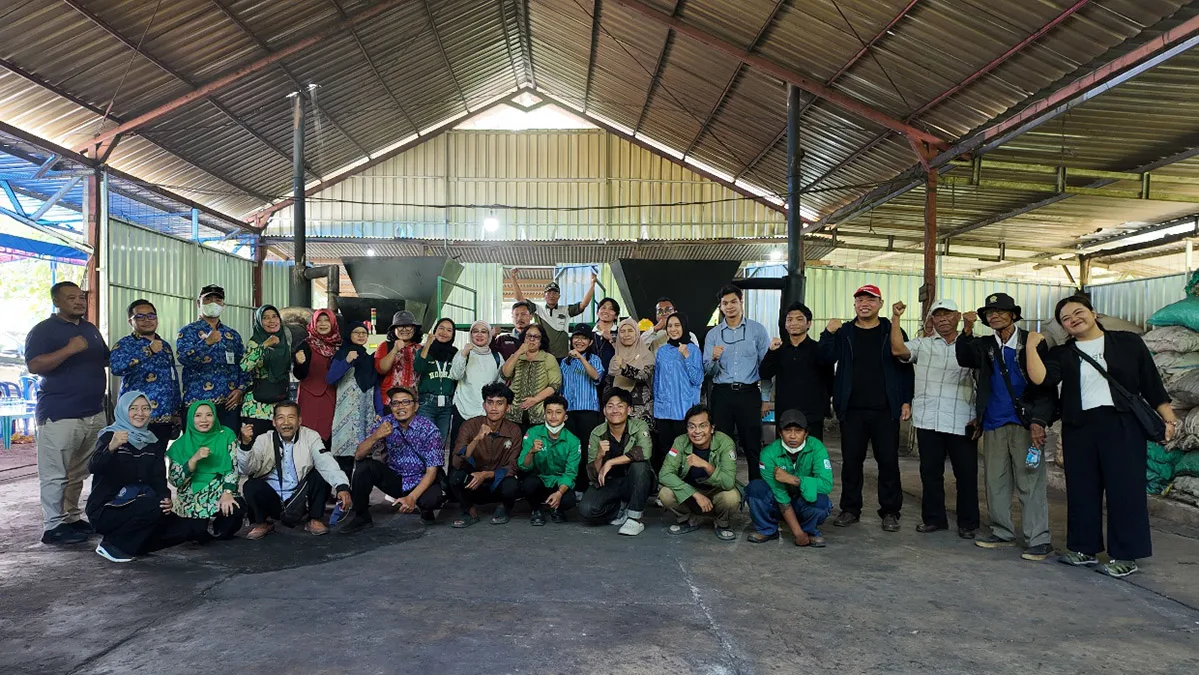In an effort to strengthen national food security and promote the transition toward a low-carbon economy, Bank Indonesia partnered with the Research and Community Service Institute (LPPM) and the Agroecotechnology Study Program, Faculty of Animal and Agricultural Sciences, Universitas Diponegoro (UNDIP) to carry out a joint community service program.
The collaboration, titled “Applying Climate Smart Agriculture (CSA) – Biochar Technology to Improve Rice Farming Productivity,” took place through two activities: a focus group discussion (FGD) and a field visit. The events took place on July 16–17, 2025, in Semarang City and Grobogan Regency, Jawa Tengah, involving a diverse range of stakeholders, including academics, central and local government representatives, agricultural extension officers, farmer groups, and agricultural technology entrepreneurs.
As one of the largest rice production centers in Jawa Tengah, Grobogan Regency faces significant challenges from climate change, soil degradation, and limited access to water. The CSA-Biochar technology provides an innovative solution to enhance soil quality, improve water-use efficiency, and boost crop productivity. Biochar—produced through the pyrolysis of biomass such as rice husks—has been scientifically proven to reduce greenhouse gas emissions by up to 91 percent for methane and 54 percent for nitrous oxide.
The FGD, held at Aruss Hotel in Semarang, was opened by LPPM UNDIP Chair Prof. Dr. Ing. Ir. Suherman, S.T., M.T., and CSA Study Lead Prof. Dr. Ir. Florentina Kusmiyati, M.Sc. In her remarks, Kusmiyati said, “Biochar is not only a technical solution but also an adaptive strategy in addressing climate change. We hope this study serves as the foundation for a green farming business model that can be replicated nationally.”
Technical presentations were delivered by Muhammad Iqbal Fauzan, S.P., M.Si., and Fatikhah Nurul Fajri, S.P., M.P., from UNDIP’s Agroecotechnology team, explaining the biochar production process, its effects on soil and crops, the business model for integrating biochar into farming, and its potential inclusion in carbon trading schemes.
The discussion featured responses from six farmer group unions (Gapoktan) and six agricultural extension coordinators from Klambu, Godong, Gubug, Karang Rayung, Grobogan, and Penawangan districts. Farmers expressed enthusiasm and high hopes for the technology. “We are delighted to be involved in this study. Biochar offers new hope for farmers, especially in areas lacking organic matter,” said Aris Yuliyanto, Chair of Gapoktan Klambu. Klambu coordinator Laili Zumrotul Hasanah added, “We want to learn more about simple ways to make biochar so farmers can apply it directly in the field.”
From a policy perspective, Herlina Rizka Wijayanti from Bank Indonesia’s Department of Inclusive and Green Finance stated, “Bank Indonesia fully supports sustainable agricultural innovations. This study is a first step toward replicating CSA-Biochar technology among BI-assisted MSMEs across Indonesia.” Support also came from the Coordinating Ministry for Food Affairs.
Kus Prisetiahadi, Assistant Deputy at the ministry, emphasized, “Biochar can reduce carbon emissions by up to 1.5 tons of CO₂. This result is highly relevant to national climate commitments. However, an economic study is needed to ensure farmers see it as a profitable investment.” Sri Mulyani from the Ministry of Agriculture added that biochar should be included in national programs and replicated widely.
The second day featured site visits to a biochar trial plot in Klambu District, PT WasteX’s biochar production facility in Wirosari District, and farmland in Penawangan District where biochar is already in use. Nabila from WasteX reported that their carbonizer technology has increased rice yields by up to 34 percent in other locations and is ready for replication in Grobogan.
The Grobogan Agriculture Office, through Angga Prasetya, noted that most farmland in the regency is rainfed, making biochar highly relevant. “This technology is up-and-coming. The challenge is making it easy and affordable for farmers. If that’s achieved, they will adopt it on their own,” he said.
The program concluded with several strategic recommendations, including expanding demonstration plots and pilot projects, providing training for household-scale biochar production, integrating biochar into sustainable agriculture policies, and replicating its use in Bank Indonesia-assisted MSMEs and carbon trading schemes.
With cross-sector collaboration and evidence-based approaches, CSA-Biochar technology is expected to become a milestone in transforming Indonesia’s agricultural system toward a greener, more resilient, and sustainable future. (Public Communication/ UNDIP/ LPPM-FPP)










